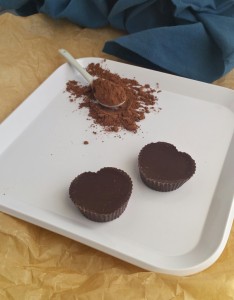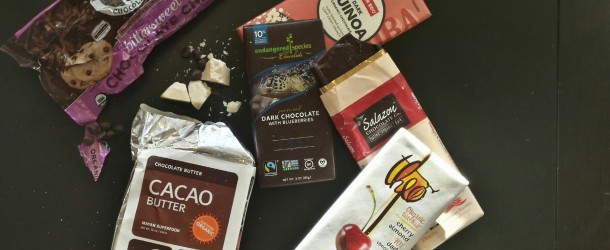Valentine’s Day may be over, but our cultural celebration of chocolate is year-round. The scientific name for the cacao tree, Theobroma cacao, literally translates to ‘food of the gods’. Humans have been enamored by this bitter bean for millennia, the most common exclamation being, “I could never live without chocolate!”
It’s a common misconception that chocolate is off the menu for vegans. Milk chocolate transparently indicates that is has a dairy component (though there are some milk chocolates made with plant milk), but dark chocolates are vegan most of the time. By essence, dark chocolate should be vegan all the time comprising of just 3 ingredients: cocoa powder, cocoa butter, and sugar. Since there aren’t any regulations for dark chocolate in the U.S., companies can and do sometimes add dairy to it even though it’s not milk chocolate. In this case, reading the label is important.
As an ethical vegan, finding out if animal ingredients are in my chocolate is not the only reason to read the chocolate packaging; there are other considerations in play. When I seek to make ethical choices, I do so not only from a position of animal rights, but from a lens of intersectionality, extending to human, animal, and environmental causes.
The chocolate industry is rife with injustice. The majority of cacao beans are harvested in Western Africa where there are massive problems with child labor and slavery. Young children – who are usually either sent by their family to earn money or kidnapped from nearby – work in hazardous conditions. If they are lucky to be paid at all, wages are so meager that they are not at all livable. There have been reported cases of children being held against their will, locked in sheds at night to keep them from escaping. A famous and chilling quote from a former child slave named Amadou speaks to the devastation, “When people eat chocolate, they are eating my flesh.”
 Feelings of frustration, guilt, and anger can come up when learning about these heinous practices, but there are plenty of positive actions you can take to indulge in your love of chocolate in an ethical manner. I’ve ordered this list from least to most impactful.
Feelings of frustration, guilt, and anger can come up when learning about these heinous practices, but there are plenty of positive actions you can take to indulge in your love of chocolate in an ethical manner. I’ve ordered this list from least to most impactful.
Buy chocolate from Latin American origin, if you cannot verify that the chocolate from Western Africa is slave-free. While the Latin American cacao industry has not been plagued by the same violations as Western Africa, that is certainly no guarantee that the chocolates from this region are ethically sound.
Look for Fair-trade and Rainforest Alliance logos on chocolates. These should only be considered as a jumping off point to purchasing more ethical chocolates. Because of fees and other expenses, many growers cannot afford to get these certifications. Also, there isn’t a strict sorting and tracking system for beans nor is there a reliable source oversight to monitor worker’s rights or environmental impact, so just because a chocolate product has one of these certifications, it doesn’t mean that they meet your ethical standards.
Take advantage of my favorite resource for ethical chocolate, The Food Empowerment Project. They have a website as well as apps for both Andoid and iPhone with lists of chocolate companies they are comfortable recommending and ones they don’t. The unapproved ones are grouped according to why they’re not recommending them which is also useful in determining which companies you’d like to support. In addition to utilizing these lists, you can also reach out to companies yourself and ask them about the source of their chocolates and inquire about any practices that you are concerned with.
Support chocolate companies that have direct relationships with their growers and make the extra effort to source all of their ingredients as ethically as possible. The more people that the product passes through, from bean to bar, the harder it is to be sure of the practices employed.
Get personal. This last tip is one that is impractical for most chocolate consumers, but it’s worth mentioning nonetheless. If you are lucky enough to build a relationship with a cacao farmer and then make your own chocolates, that is the best way to be knowledgeable about where your chocolate comes from and what is going on behind the scenes.
Child labor and slavery is just one – a major one – of the ethical issues surrounding chocolate. Another big one is palm oil, and if you are interested in learning more about the palm oil industry, there is a very thorough article posted on Chic Vegan here.
While these issues are serious, once you are educated about the subject, a fudgy vegan brownie or a mug of creamy dark hot chocolate will weigh much lighter on your conscience and you can focus on the heart-opening, mood-supporting, and energizing effects of this god(dess) food!

Good article. I like the way you started it off with “If you’re like most dudes”. I am 42 but still use dudes to refer to guys. I am all for organic and appreciate the article about chocolate and the big, bad companies. I support the most natural, honest companies. Don’t know if my honey will get me chocolates tomorrow, but most likely not. That’s a no no for him as he has enough addictions. Chocolate being one of them.